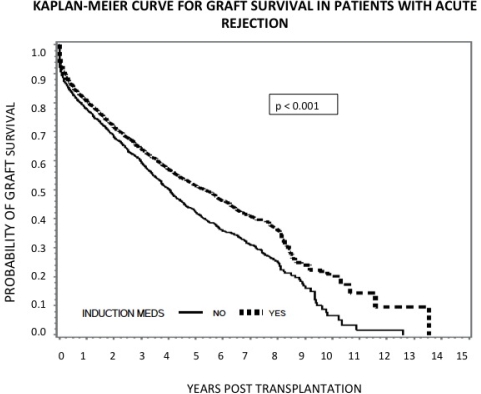Induction Therapy Improves 15-Year Graft Survival in Kidney Transplant Recipients With Acute Rejection
Transplant Institute, Henry Ford Hospital, Detroit, MI.
Meeting: 2015 American Transplant Congress
Abstract number: 285
Keywords: Graft survival, Induction therapy, Kidney transplantation, Outcome
Session Information
Session Name: Concurrent Session: Kidney: Induction
Session Type: Concurrent Session
Date: Monday, May 4, 2015
Session Time: 4:00pm-5:30pm
 Presentation Time: 4:24pm-4:36pm
Presentation Time: 4:24pm-4:36pm
Location: Room 120-ABC
Background: Graft(GS) and patient survival(PS) has been shown to be superior in patients without delayed graft function (DGF) or acute rejection(AR). Induction therapy(IT) is frequently given at the time of kidney transplantation(KT) in the setting of DGF and to lower the incidence of AR. Many studies have shown improved GS in patients with IT. AR is a well known risk factor for lower long-term GS.However, limited data has evaluated GS in patients who developed AR despite receiving IT. This study aimed to evaluate if IT would influence PS and GS in those KT recipients(R) who developed AR.
Methods: The UNOS database retrospectively analyzed KT from 1995 onward involving adult recipients with first KT and no other simultaneous organ transplants. IT included both, lymphocyte-depleting and non lymphocyte-depleting agents. Kaplan-Meier analysis was used to estimate GS and PS during follow-up. We specifically compared GS and PS in patients with presence versus absence of AR.
Results: A total of 222,058 patients met inclusion criteria for analysis. 147,252 patients received IT. 2.5% of patients without IT medications developed AR compared to 2.1% of patients with IT medications (p<0.001). There was no significant clinical difference in baseline patient characteristics. A Kaplan-Meier curve of GS in patients with AR showed a significant improvement at 15 years in those patients given IT medications compared to those without. The Kaplan-Meier curve of overall 15-year PS failed to show a significant mortality difference. 
Discussion: IT is widely used to prevent AR in order to improve GS and PS. If patients develop AR despite receiving IT, current data would suggest that overall GS would be comparable to those without IT. This study showed that patients receiving IT have an improved 15-year GS despite developing AR. The overall 15-year patient mortality benefit of induction medications in those with acute rejection, however, showed no significant difference. Further analysis are being conducted to determine if various types of IT have differing long-term outcomes.
To cite this abstract in AMA style:
Bajoka R, Goggins M, Patel A. Induction Therapy Improves 15-Year Graft Survival in Kidney Transplant Recipients With Acute Rejection [abstract]. Am J Transplant. 2015; 15 (suppl 3). https://atcmeetingabstracts.com/abstract/induction-therapy-improves-15-year-graft-survival-in-kidney-transplant-recipients-with-acute-rejection/. Accessed July 12, 2025.« Back to 2015 American Transplant Congress
